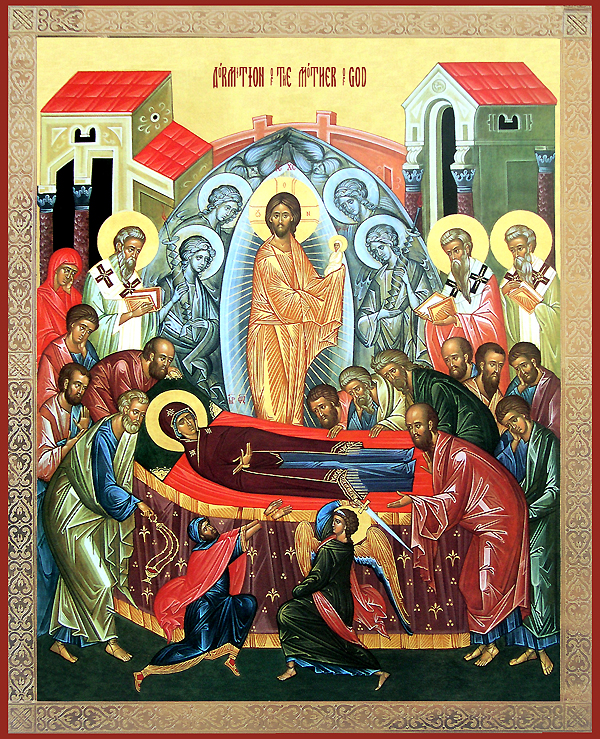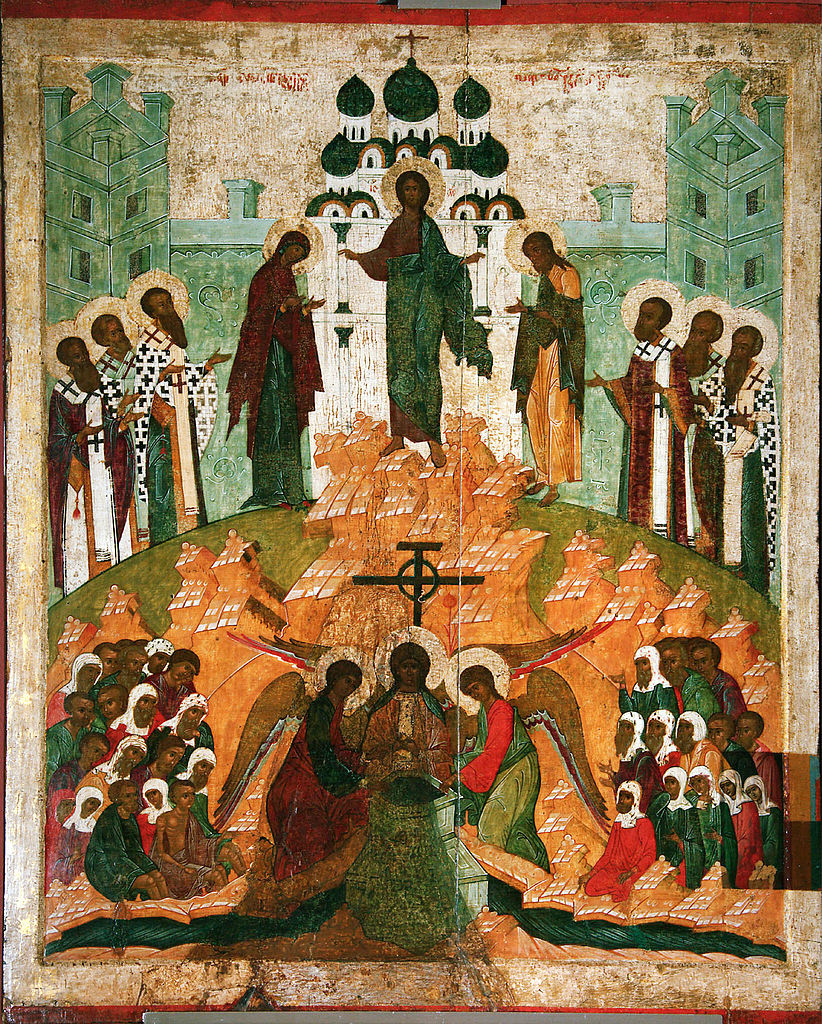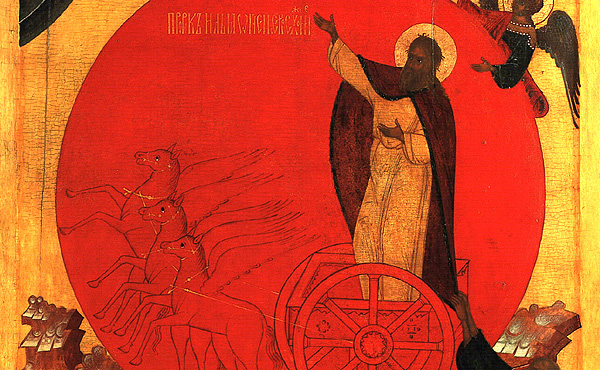Theology
Dormition of the Theotokos
28. August 2017 - 11:51 The feast of the Dormition or Falling-asleep of the Theotokos is celebrated on the fifteenth of August, preceded by a two-week fast. This feast, which is also sometimes called the Assumption, commemorates the death, resurrection and glorification of Christ’s mother. It proclaims that Mary has been “assumed” by God into the heavenly kingdom of Christ in the fullness of her spiritual and bodily existence.
The feast of the Dormition or Falling-asleep of the Theotokos is celebrated on the fifteenth of August, preceded by a two-week fast. This feast, which is also sometimes called the Assumption, commemorates the death, resurrection and glorification of Christ’s mother. It proclaims that Mary has been “assumed” by God into the heavenly kingdom of Christ in the fullness of her spiritual and bodily existence.
As with the nativity of the Virgin and the feast of her entrance to the temple, there are no biblical or historical sources for this feast. The Tradition of the Church is that Mary died as all people die, not “voluntarily” as her Son, but by the necessity of her mortal human nature which is indivisibly bound up with the corruption of this world.
Sermon on the 12th Sunday after Pentecost: The rich young ruler
27. August 2017 - 16:08 Matthew 19:16-26
Matthew 19:16-26
In the name of the Father, and the Son, and the Holy Spirit. Amen. Today, the 12th Sunday after Pentecost, we read about the rich young ruler. This is a very important story, because it is in all three synoptic gospels, and is has a very important question: What good thing shall I do that I might have eternal life.
On the Dormition Fast, and the Cross of Christ
18. August 2017 - 12:04 Again, by God’s mercy, we are entering the Dormition fast. This is the shortest and sweetest of the fasts. It begins with the blessing of honey, and then the blessing of the fruits. This fast is also the lightest, because the Mother of God takes care that the yoke of Christ would be light for us. She takes care for our bodies as well as our souls.
Again, by God’s mercy, we are entering the Dormition fast. This is the shortest and sweetest of the fasts. It begins with the blessing of honey, and then the blessing of the fruits. This fast is also the lightest, because the Mother of God takes care that the yoke of Christ would be light for us. She takes care for our bodies as well as our souls.
This fast begins with the blessing of honey, so that we would know not only of the sweetness that the Lord provides for our bodies, but also of spiritual sweetness; so that the sweetness that comes from the Cross of Christ would be revealed to us throughout the fast. Just as once in the Old Testament the wood was lowered into the bitter waters of Marah and they became sweet and pleasant, so let it be with all our lives—let our bitterness be changed to sweetness from our touching the Cross of Christ.
Questions for Self-Examination
8. August 2017 - 10:22
- How often are we consciously mindful of the Holy Spirit?
- Are we attentive to the Holy Spirit beyond the period celebrating Pentecost?
- Do we think consciously of the fruit of the Spirit?( Galatians 5:22-23)
- Do we live in ways to experience the fruit of the Spirit?
- Are our prayers focused with intent to experience God?
The Essence of Christianity
7. August 2017 - 16:04 Bishop Alexander (Mileant)
Bishop Alexander (Mileant)
"Be ye therefore perfect, even as your Father Which is in heaven is perfect" (Matt. (continue from last Sunday.)
Certainly, no one wishes to be condemned to hell. Everyone wants to enter the Kingdom of Heaven. It is crucial to understand, however, that the Kingdom of Heaven is not so much a place as a state. When the scribes asked when the Kingdom of Heaven would be revealed, Christ answered: "The kingdom of God cometh not with observation: neither shall they say, Lo here!, or Lo there! for, behold, the kingdom of God is within you" (Luke 17:20). Saying so, the Lord showed that salvation is intimately connected with a man’s interior state. Salvation is not simply a move from the present conditions of life to different and better conditions; it is something more profound and wonderful. As Scripture says, "If favour is shown to the wicked, he does not learn righteousness; in the land of uprightness he deals perversely and does not see the majesty of the Lord" (Isa. 26: 10, RSV). In other words, even when his exterior conditions improve, the wicked man continues to be envious, hateful, and quarrelsome, for he is tormented by a thirst for sensual pleasures; thus, he bears hell in himself. True joy, peace, and blessedness are inner states that come to a man as a result of a relationship with God, which the unrepentant refuse and do not share in. The righteous man, no matter where he is, will always have the delight of communion with God, bearing paradise within himself.
Did Enoch and Elijah (Elias) Ascend into Heaven?
4. August 2017 - 14:44 In His night conversation with Nicodemus, the Savior says, And no man hath ascended up to Heaven, but He that came down from Heaven, even the Son of man Which is in Heaven (Jn. 3:13). Many opponents of Christ see in this phrase a contradiction in the words of Scripture, for the Old Testament relates how Elijah ascended into Heaven and how God took Enoch to Himself. Let’s try to sort this issue out, using the Tradition of the fathers of the Church as the key to Scripture.
In His night conversation with Nicodemus, the Savior says, And no man hath ascended up to Heaven, but He that came down from Heaven, even the Son of man Which is in Heaven (Jn. 3:13). Many opponents of Christ see in this phrase a contradiction in the words of Scripture, for the Old Testament relates how Elijah ascended into Heaven and how God took Enoch to Himself. Let’s try to sort this issue out, using the Tradition of the fathers of the Church as the key to Scripture.

